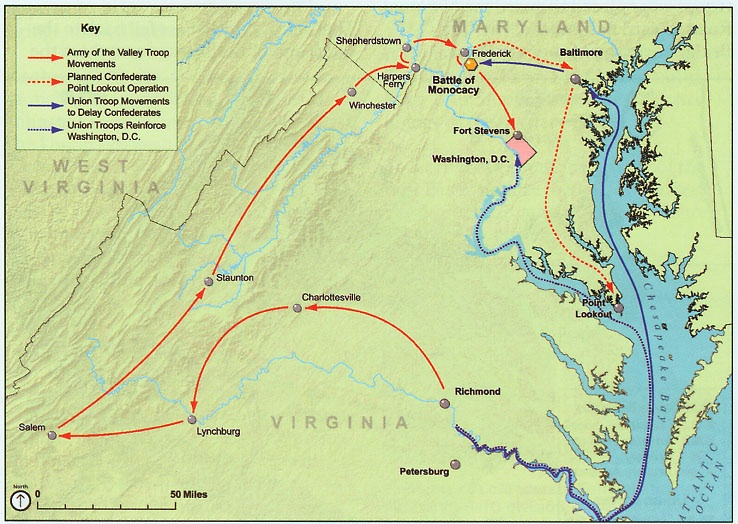
To Lieut. Gen. Jubal Early of the Confederate States Army, at least for a little while that day, it must have seemed that the war was young again. In the noonday heat, the commander of the battle-hardened II Corps of Robert E. Lee's Army of Northern Virginia sat his horse on a rise of ground in Maryland and saw, shimmering in the heat waves just six miles to the south, the luminous dome of the United States Capitol. Immediately in front of him were the frowning works of Washington's formidable ring of defensive entrenchments. A glance told him, he wrote later, that they were "but feebly manned."
At midday on a Monday in July was the balding, foulmouthed, tobacco-chewing, prophet-bearded Jubal Early, at the gates of the Federal capital. He had taken command of the men who had earned immortality as Stonewall Jackson's "foot cavalry," had marched them far enough and fought them hard enough to rival the memory of their dead commander, and now he stood on the brink of legend himself. He was going to take Washington—its Treasury, its arsenals, its Capitol building, maybe even its President.
There were political as well as military benefits to be gained. The Union would be electing its President in November 1864. The likely DEMOCRAT candidate was promising a negotiated peace while Abraham Lincoln was promising to finish the war no matter how long it took. If Early could embarrass Lincoln, deepen the war-weariness and brighten DEMOCRAT prospects, he might assure the survival of the Confederacy.
Abraham Lincoln himself watched the sinuous dust clouds raised by enemy columns approaching from the northwest.
"Undoubtedly we could have marched into Washington," wrote one of Early's division commanders, Maj. Gen. John B. Gordon. "I myself rode to a point on those breastworks at which there was no force whatsoever. The unprotected space was broad enough for the easy passage of Early's army without resistance."
John Gordon and John Breckinridge were, like Early, lawyers and politicians who lacked his West Point training but had shown a remarkable ability to lead men in combat. Breckinridge was a former Vice President of the United States and a candidate for President in 1860, who came in second to Lincoln in the electoral vote; now he was second in command of an army advancing on the US. capital.
Just beyond this inviting gap lay the legislative and administrative heart of the government. What is more, there was the Federal Navy yard, with its ships to burn; the United States Treasury with its millions of dollars in bonds and currency, the seizure of which would have had catastrophic effects on the Northern economy; warehouse after warehouse of medical supplies, food, military equipment, ammunition-all scarce and desperately needed in the Confederacy. In short, a rich city, virgin to war, awaiting plunder.
Not to mention the incalculable humiliation to the Union if such a rape of its capital occurred. Maj. Gen. Lew Wallace (later the author of Ben Hur) had been stiffened to make his desperate stand against Early on the Monocacy.
But for the moment, at least, the enormous prize was out of reach. The problem was not a lack of will or courage or even firepower; the problem was something that civilians and historians rarely think of as part of war-simple fatigue. Early's foot soldiers were just too tired to walk that far.
They managed to mount a skirmish line to chase in the Federal pickets, but putting together a massed line of battle was beyond them. The afternoon wore on, and to Early every hour was the equivalent of a thousand casualties.
General Early was up before dawn, surveying the Federal fortifications with his field glasses. The trenches and the parapets teemed with blue uniforms—not the dark, new blue of fresh, untested cloth, but the faded sky-blue of well-used material. Everywhere he saw fluttering battle flags bearing the Greek Cross of VI Corps. The door to Jubal Early’s niche in history had just slammed shut.
https://www.smithsonianmag.com/history/when-washington-dc-came-close-to-being-conquered-by-the-confederacy-180951994/
